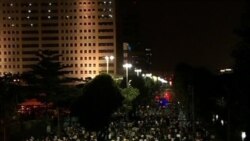Brazil's president has held an emergency cabinet meeting to discuss an intensifying protest movement that has not slowed down despite government concessions.
President Dilma Rousseff did not give a statement after the meeting Friday, but her office says she will address the nation later in the evening.
The protests continued Friday with hundreds gathering in several cities, including Rio de Janeiro and Sao Paulo.
On Thursday, at least one million protesters rallied in dozens of cities across Brazil, including at least 300,000 in Rio de Janeiro, where police fired tear gas to contain the crowds.
Rousseff has already called off a trip to Japan planned for next week to respond to the protests, the country's biggest in two decades.
This week's protests were originally triggered by an increase in bus and subway fares, but protesters have since focused on what they say is the government's neglect of public services, high taxes, and rampant corruption.
Protesters have been undeterred by the news that Sao Paulo and Rio de Janeiro have scrapped plans to increase public transportation fees.
The protests also are targeting the billions of dollars being spent to host the 2016 Summer Games, next year's World Cup and this month's Confederations Cup.
President Dilma Rousseff did not give a statement after the meeting Friday, but her office says she will address the nation later in the evening.
The protests continued Friday with hundreds gathering in several cities, including Rio de Janeiro and Sao Paulo.
On Thursday, at least one million protesters rallied in dozens of cities across Brazil, including at least 300,000 in Rio de Janeiro, where police fired tear gas to contain the crowds.
Rousseff has already called off a trip to Japan planned for next week to respond to the protests, the country's biggest in two decades.
This week's protests were originally triggered by an increase in bus and subway fares, but protesters have since focused on what they say is the government's neglect of public services, high taxes, and rampant corruption.
Protesters have been undeterred by the news that Sao Paulo and Rio de Janeiro have scrapped plans to increase public transportation fees.
The protests also are targeting the billions of dollars being spent to host the 2016 Summer Games, next year's World Cup and this month's Confederations Cup.






